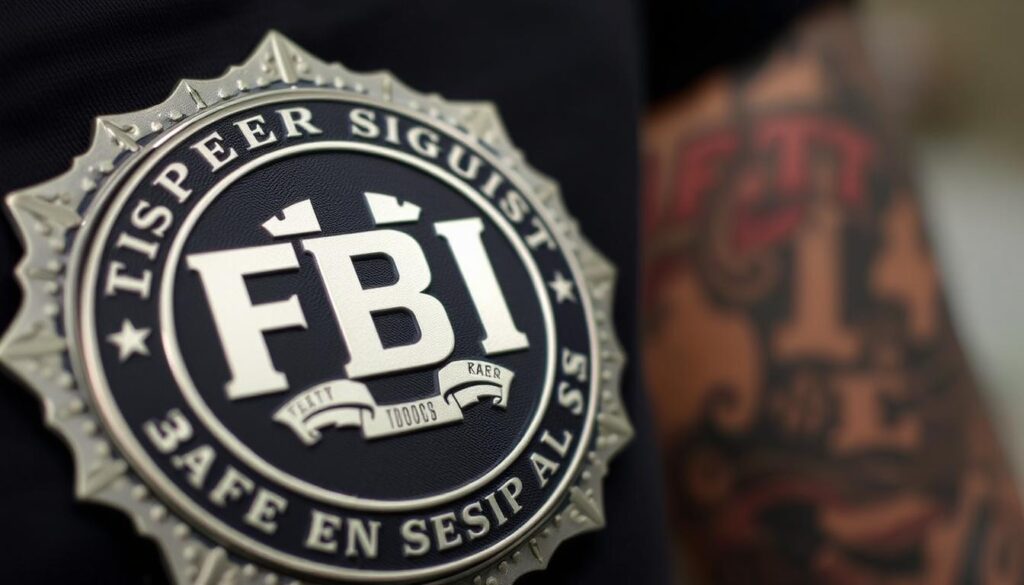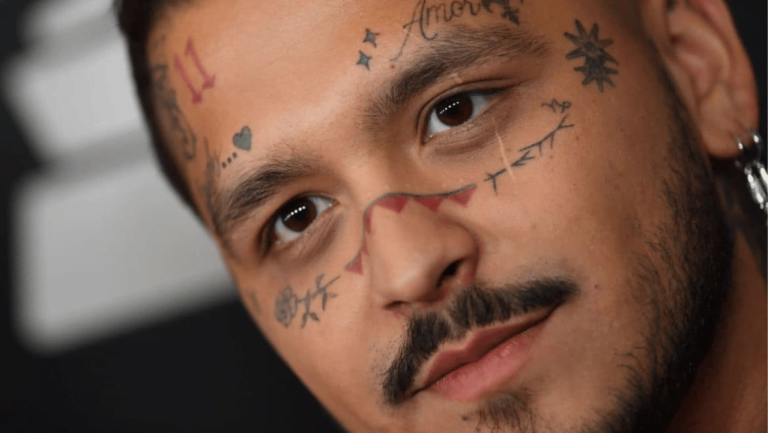The FBI is known for its prestigious and demanding role in law enforcement. With such a high-stakes job, it’s natural to wonder about the agency’s tattoo policy. Can FBI agents have tattoos? Let’s explore the FBI’s stance on ink and what it means for aspiring agents.
Key Takeaways:
- The FBI has evolved its tattoo policy in recent years to reflect changing societal acceptance.
- While there is no official ban on tattoos, the FBI prioritizes professionalism and a clean appearance.
- Offensive or disruptive tattoos may impact an applicant’s chances of being selected.
- Consider the content and location of tattoos to maintain a professional image during the application process.
- The FBI does not specifically prohibit sleeve tattoos but adhering to professionalism standards is crucial.
The Evolution of the FBI’s Tattoo Policy
The FBI’s tattoo policy has undergone significant changes in recent years, reflecting the evolving societal attitudes towards tattoos. While the agency historically prohibited agents from having visible tattoos, it has since adapted to the growing acceptance of body art.
Unlike in the past, the FBI does not currently have an official tattoo policy in place. However, this does not mean that agents can freely display any type of tattoo. The agency maintains high standards for professionalism and appearance, which still factor into the employment guidelines.
The change in the FBI’s tattoo policy can be attributed to the broader shift in public perception towards tattoos. In the past, tattoos were often associated with criminal activity, leading to their exclusion from the agency’s strict guidelines. However, as tattoos have become more mainstream and accepted as forms of self-expression, the FBI has adjusted its approach.
While there is no official tattoo policy, it is important for FBI agents to exercise discretion when considering tattoos. The content and location of the tattoos will still be taken into account during the application and employment process.
To maintain a professional image, the FBI advises agents to avoid tattoos that may be deemed offensive or disruptive. While the agency recognizes the growing popularity of tattoos, it also emphasizes the importance of projecting a clean and professional appearance.
The FBI’s employment guidelines for tattoos reflect the agency’s commitment to upholding its image and reputation. Although there has been a relaxation on the tattoo policy, it is essential for agents to exercise good judgment when choosing their body art. Offending and disruptive tattoos can still have negative consequences during the application process and throughout an agent’s career.
FBI Tattoo Policy Guidelines:
| Tattoo Regulations | Description |
|---|---|
| Visible tattoos | Tattoos that can be seen when wearing the FBI standard uniform are subject to scrutiny. |
| Tattoo content | Tattoos with offensive, inappropriate, or extremist content are strongly discouraged. |
| Tattoo location | Tattoos on sensitive or easily visible areas, such as the face, neck, or hands, should be avoided. These may be considered too disruptive or unprofessional. |
| Covering tattoos | While there is no blanket ban on tattoos, agents may be required to cover their tattoos in certain situations or when a higher level of formality is necessary. |
It is important to note that the FBI’s tattoo policy is subject to change, as societal norms continue to evolve. The agency’s priority remains centered around maintaining professionalism and upholding its reputation as a premier law enforcement organization.
Aspiring FBI agents who have tattoos or are considering getting one should carefully weigh their options and consider the agency’s guidelines when making decisions about their body art.
Tattoo Policies in Other Branches of the Military
While the FBI is not part of the military, it can still be valuable to explore the tattoo policies of other branches of law enforcement to gain a better understanding of industry standards. Each branch has its own set of regulations governing tattoos, with some allowing tattoos in specific areas and others instituting a complete ban on visible tattoos.
Here’s a comparative look at the tattoo policies in various branches:
| Branch | Tattoo Policy |
|---|---|
| Police | Many police departments have specific tattoo policies that may limit the size and placement of tattoos, with a particular focus on visible tattoos. Offensive or gang-related tattoos are typically prohibited. |
| Sheriff’s Office | Sheriff’s offices often have similar tattoo policies to police departments, with restrictions on visible tattoos and a prohibition on offensive or inappropriate designs. |
| State Troopers | Tattoo policies for state troopers can vary depending on the state. Some states may allow tattoos that can be covered by the uniform, while others have stricter regulations. |
| Border Patrol | U.S. Border Patrol has specific guidelines regarding tattoos. Visible tattoos that are deemed offensive, extremist, or gang-related are generally prohibited. The content and placement of tattoos are thoroughly evaluated during the application process. |
| Corrections | Tattoo policies for correctional officers also differ among institutions. Many correctional facilities restrict visible tattoos and may have specific guidelines regarding content and placement. Offensive or gang-related tattoos are strictly prohibited. |
Understanding the tattoo policies in these various branches of law enforcement can provide valuable insight into the broader landscape of ink regulations within the field. Aspiring FBI agents with tattoos should recognize that while the FBI does not have explicit regulations, maintaining a professional appearance is important in any law enforcement career.
Having a clear understanding of tattoo policies in different branches of law enforcement can help prospective FBI agents navigate the application process and make informed decisions about their tattoos. It’s crucial to consider the content and placement of tattoos to ensure they align with the professionalism expected in the field of law enforcement.
The FBI’s Stance on Tattoos
When it comes to tattoos, the FBI does not have an official tattoo policy in place. Instead, they prioritize professionalism and a clean appearance for their agents. While tattoos are generally accepted, the content and location of tattoos are still factors that can be considered during the application process.
The FBI understands that tattoos have become more socially acceptable in recent years, but they still maintain high standards for their agents. Offensive or disruptive tattoos may count against an applicant, as they can create a negative image for the agency.
Content and Location Matter
The content and location of tattoos can have an impact on an applicant’s chances of being hired by the FBI. It is important to note that visible tattoos should align with the FBI’s professionalism standards. Tattoos that are offensive, violent, or disruptive in nature may raise concerns about an applicant’s ability to portray a professional image.
While there are no specific guidelines regarding the types of tattoos that are accepted or prohibited, it is advised to err on the side of caution and consider the potential implications of tattoos in the FBI’s work environment.
Application Process Considerations
During the application process, the FBI may review an applicant’s tattoos and their placement to ensure they meet the agency’s standards. While there is no blanket ban on tattoos, it is important for applicants to present themselves in the best possible light.
The FBI looks for candidates who can represent the agency professionally, both in their appearance and conduct. Tattoos that are easily concealed or can be covered with appropriate attire may have less impact, while tattoos that are prominently displayed may draw more attention during the application process.
Maintaining Professionalism
For those considering a career with the FBI, it is crucial to maintain a professional appearance. Even if tattoos are accepted, it is advisable to choose tattoos that can be easily covered or concealed when necessary.
The overall goal is to project professionalism and to ensure that tattoos do not hinder an agent’s ability to perform their duties effectively or adversely affect their interactions with the public.
Advice for Potential FBI Agents with Tattoos
If you are interested in pursuing a career with the FBI but have tattoos, it’s essential to understand the FBI’s guidelines regarding inked skin. While there is no official ban on tattoos for FBI agents, it is crucial to consider the content and location of your tattoos to maintain a professional appearance in line with the FBI’s high standards.
Offensive or disruptive tattoos can have an impact on your application process. To improve your chances of success, it is advisable to avoid tattoos with explicit content or symbols that may be deemed offensive. Additionally, tattoos in prominent or highly visible areas, such as the face or hands, may raise concerns about representing the FBI’s professional image.
By taking these considerations into account, you can optimize your chances of becoming an FBI agent even with tattoos. It is important to note that each application is evaluated on a case-by-case basis, considering the overall qualifications and suitability for the role you are applying for. A tattoo that aligns with the FBI’s appearance guidelines and does not compromise professionalism may not pose significant obstacles in your application process.
Should you decide to move forward with your application, ensure that you present yourself respectfully and professionally during all stages of the recruitment process. Highlight your skills, qualifications, and dedication to public service, demonstrating your commitment to upholding the FBI’s values. Ultimately, your abilities and character will play a significant role in determining your suitability for a career with the FBI, with tattoos being just one aspect to consider.
Summary: Advice for Potential FBI Agents with Tattoos
- Consider the content and location of your tattoos to maintain a professional appearance.
- Avoid offensive or disruptive tattoos to improve your chances of success in the application process.
- Highly visible tattoos, such as those on the face or hands, may raise concerns about representing the FBI’s professional image.
- Each application is evaluated on a case-by-case basis, considering overall qualifications and suitability for the role.
- Focus on presenting yourself respectfully and professionally throughout the recruitment process.
Can FBI Agents Have Sleeve Tattoos?
The FBI does not have a specific ban on sleeve tattoos. However, all tattoos must adhere to the FBI’s standards of professionalism and should not be offensive or disruptive. In certain situations, covering up or modifying a sleeve tattoo may be necessary to maintain a professional appearance.
While sleeve tattoos are not explicitly prohibited, it’s important to consider the context in which an FBI agent may find themselves. The appearance standards set by the FBI emphasize professionalism and the ability to blend into various environments. Sleeve tattoos, particularly if they are large or highly visible, may draw unnecessary attention or be seen as unprofessional in certain situations.
Individuals with sleeve tattoos may be required to cover them up with clothing or makeup to maintain a more conservative appearance, especially when interacting with the public or working on sensitive cases.
It’s important to note that appearance standards for FBI agents are subject to change and may be affected by societal perceptions and evolving cultural norms. However, the FBI places a high emphasis on maintaining a professional image and ensuring that agents are able to perform their duties effectively while representing the bureau.
The Advantages and Disadvantages of Sleeve Tattoos for FBI Agents
While sleeve tattoos may be a personal expression of identity and creativity, there are both advantages and disadvantages to consider when it comes to FBI agents:
- Advantages:
- Allowing agents to express their individuality while off-duty
- Potentially increasing rapport with community members who have tattoos
- Disadvantages:
- Can be seen as unprofessional or distracting
- Might require covering up or modifying the tattoo in certain situations
Ultimately, the decision to have a sleeve tattoo as an FBI agent is a personal one. However, it’s important to carefully consider the potential implications and impact on professional image and the ability to effectively carry out the duties of an FBI agent.
| FBI Agent Appearance Standards | FBI Tattoo Policy | Tattoo Regulations for FBI Agents |
|---|---|---|
| Emphasizes professionalism and a clean appearance | No specific ban on sleeve tattoos | Tattoos must adhere to professionalism standards |
| Takes into account potential public interaction and sensitive cases | Tattoos should not be offensive or disruptive | Covering up or modifying tattoos may be necessary |
| Subject to change based on societal perceptions and cultural norms | Considers various factors for each applicant | Individual evaluation during the application process |
Can FBI Agents Have Neck Tattoos?
While the FBI does not have a specific ban on neck tattoos, it is generally advisable to avoid getting them if you are considering a career with the FBI. Neck tattoos are often seen as unprofessional and may be perceived as too disruptive to maintain the FBI’s high standards of appearance.
As an FBI agent, you represent the organization and uphold its reputation in the eyes of the public. Maintaining a clean and professional appearance is vital to gaining trust and credibility. Neck tattoos, due to their visibility, can potentially hinder your ability to effectively carry out your duties and may create a negative perception among colleagues, superiors, and the community you serve.
It is crucial to remember that while there is no official ban on neck tattoos, the overall image you project as an FBI agent plays a significant role in your ability to perform your job effectively. Therefore, it is recommended to exercise caution and consider the long-term implications before getting a neck tattoo if you have aspirations of joining the FBI.
If you already have a neck tattoo and still wish to pursue a career with the FBI, keep in mind that the content and location of your tattoo will be carefully evaluated as part of the application process. Offensive, discriminatory, or otherwise inappropriate tattoos may negatively impact your chances of being accepted into the agency.
Ultimately, it is essential to prioritize professionalism and a clean appearance when considering a career with the FBI. While the organization continues to evolve in its stance on tattoos, it is advisable to err on the side of caution and maintain a conservative and professional image.
Conclusion
The FBI’s tattoo policy has undergone significant changes in recent years to align with evolving societal norms and values. While the FBI does not have a specific ban on tattoos, agents are expected to maintain a professional appearance and adhere to the organization’s standards of professionalism and cleanliness. This includes considering the content and location of their tattoos.
As tattoos become more accepted in society, the FBI has embraced this cultural shift, recognizing that visible tattoos do not necessarily impede an individual’s ability to serve effectively as an agent. However, offensive or disruptive tattoos may still be a factor considered during the application process.
Ultimately, the FBI’s focus remains on upholding its high standards of professionalism and image. As the organization continues to evolve, it is important for potential FBI agents to be mindful of their tattoo choices, considering how they may impact their chances of success and their ability to convey a professional image throughout their career.
FAQ
Can FBI agents have tattoos?
What is the FBI’s tattoo policy?
Are neck tattoos allowed for FBI agents?
Can FBI agents have sleeve tattoos?
What are the tattoo policies in other branches of law enforcement?
What is the FBI’s stance on tattoos?
Are there any guidelines for potential FBI agents with tattoos?
Has the FBI’s tattoo policy changed over time?
Forhad
Forhad's writing is not just about the artistry of tattoos or the latest trends in the industry; it's an exploration of the deep-rooted connections people have with their tattoos, reflecting personal narratives, cultural histories, and moments of transformation. Through a mix of in-depth features, personal narratives, and insightful analyses, he sheds light on the multifaceted nature of tattooing, revealing the emotional and cultural layers that lie beneath the surface.













